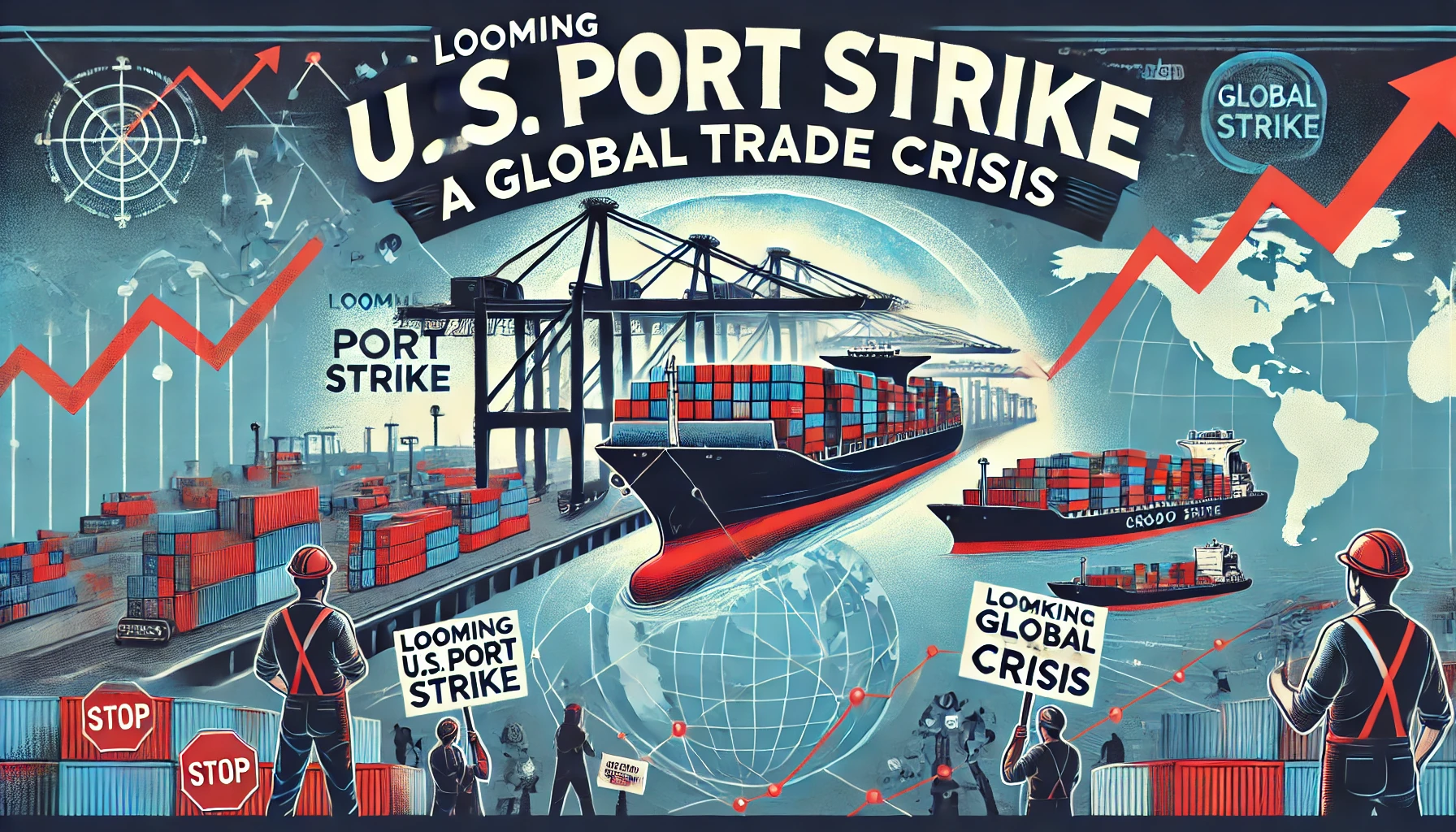How the Looming U.S. Port Strike Could Disrupt Global Trade: Labor Negotiations at Critical Ports
As the U.S. braces for a potential dockworkers strike, businesses across the nation and beyond are preparing for what could become a major disruption to the supply chain. The impending U.S. port strike threatens not just the logistics sector, but also industries reliant on smooth trade operations, such as retail, manufacturing, and automotive. If the strike materializes, the effects could be widespread, leading to global trade disruptions, increased port congestion, and severe shipping delays. With this backdrop, understanding the ongoing labor negotiations and the potential fallout from a port strike is crucial.
The U.S. Port Strike: What’s at Stake?
U.S. ports, particularly along the East and Gulf Coasts, play a critical role in maintaining the flow of goods across the country and the world. The International Longshoremen’s Association (ILA), representing dockworkers at 36 major ports, has been engaged in tense negotiations with the U.S. Maritime Alliance (USMX) over wages, safety, and working conditions. As the September 30th deadline looms for contract negotiations, the threat of a dockworkers strike seems increasingly likely(Benzinga).
A strike would significantly impact the U.S. economy, halting almost half of the nation’s ocean trade. The East Coast and Gulf Coast ports handle billions of dollars in trade annually, making them vital to both U.S. domestic commerce and international trade. If port labor negotiations break down and a strike occurs, it could trigger a new wave of supply chain crisis in 2024.
Port Congestion and Shipping Delays: Immediate Concerns
One of the immediate consequences of a U.S. port strike would be widespread port congestion. U.S. ports are already facing logistical challenges, with some reporting increased wait times and shipment rerouting due to rising tensions between the ILA and USMX(AOL.com). A full-blown strike would exacerbate these issues, leading to severe shipping delays as containers stack up and transportation becomes bottlenecked.
- Increased Wait Times: Even without a strike, shipping companies are reporting significant delays as dockworkers prepare for potential stoppages.
- Rerouting of Cargo: To avoid congestion, some companies are already shifting cargo to West Coast ports, though this may not be a sustainable long-term solution(Supply Chain World magazine).
Industries that rely on just-in-time delivery systems, like retail and automotive manufacturing, would be hit hardest. These businesses depend on a consistent flow of goods to keep production and sales running smoothly. With shipping delays, retailers may face shortages of key products, especially as the holiday season approaches.
Global Trade Disruption: The Ripple Effect of a U.S. Port Strike
The impact of a U.S. port strike would not be confined to the United States. Global trade disruption would soon follow, with many countries, particularly Canada, Mexico, and European nations, feeling the effects. U.S. ports serve as critical gateways for imports and exports, and a halt in operations could lead to backlogs at ports globally(Supply Chain World magazine)(Global Training Center).
Several industries would be vulnerable to these disruptions:
- Automotive Manufacturing: The automotive industry relies heavily on the timely import and export of parts and finished vehicles. A dockworkers strike could lead to production delays, ultimately slowing down supply chains.
- Consumer Electronics: Electronics, which are often manufactured in Asia and shipped to U.S. ports, could experience delays, resulting in product shortages.
- Retail Sector: The strike could particularly hit the retail industry, which is preparing for the holiday shopping season. With retail supply chain risks rising, businesses are scrambling to secure inventory before potential disruptions(AOL.com).
Retail Supply Chain Risk: Preparing for the Crisis
Retailers, in particular, are facing heightened risks as the U.S. supply chain impact becomes more imminent. Many businesses are already taking steps to mitigate potential shortages and delays, including pulling orders forward and increasing stockpiles of key goods(Benzinga).
However, these measures may only provide temporary relief. If the U.S. port strike drags on, retailers could face longer-term challenges:
- Higher Costs: The cost of goods could rise as retailers compete for limited inventory.
- Disrupted Supply Chains: Retailers may struggle to maintain adequate stock levels, resulting in product shortages and missed sales opportunities during peak seasons.
- Risk to Small Businesses: Small retailers, who may lack the resources to absorb increased costs or find alternative supply chain routes, could be disproportionately affected.
The Role of Port Labor Negotiations and the Potential Outcomes
At the heart of this looming crisis are the ongoing port labor negotiations between the ILA and USMX. The union is advocating for improved wages, better safety protocols, and stronger job security in the face of increasing automation at the ports(Supply Chain World magazine). The U.S. Maritime Alliance, on the other hand, is focused on maintaining operational efficiency and keeping costs manageable.
If these negotiations fail, and a strike ensues, it would have widespread repercussions across various sectors. However, there are several potential outcomes that could mitigate the crisis:
- Federal Intervention: The Biden administration may intervene to prevent a prolonged strike, possibly invoking the Taft-Hartley Act to force workers back to their jobs(Global Training Center). However, this could be politically tricky for a pro-union administration.
- Short-Term Strike: In a more optimistic scenario, a short-term strike may occur, lasting only a few weeks, with minimal damage to the supply chain. However, even a brief stoppage could cause significant delays during peak shipping season.
- Compromise in Negotiations: The best-case scenario would involve a compromise between the ILA and USMX, preventing a strike altogether and ensuring the continuity of port operations.
Mitigating Supply Chain Crisis: What Businesses Can Do
While the outcome of the port labor negotiations remains uncertain, businesses can take proactive steps to mitigate the potential fallout from a U.S. port strike:
- Reroute Cargo: Companies can explore rerouting shipments to alternative ports, though this may only provide limited relief depending on congestion levels elsewhere.
- Increase Inventory: Businesses, particularly retailers, should consider increasing their stock levels in anticipation of possible shortages.
- Strengthen Supplier Relationships: Strengthening ties with key suppliers can help secure priority shipments and negotiate more favorable terms during a crisis(Supply Chain World magazine).
- Diversify Supply Chains: In the long term, businesses should consider diversifying their supply chains to reduce reliance on a single region or port, thereby minimizing risks in the event of future disruptions.
Navigating the 2024 Supply Chain Crisis
As the potential U.S. port strike draws nearer, businesses and industries across the country are bracing for significant disruptions. With the possibility of port congestion, shipping delays, and global trade disruption, it’s clear that a prolonged strike could have a ripple effect across multiple sectors. The retail supply chain risk is especially high as companies prepare for peak seasons amid uncertainty.
The outcome of the port labor negotiations will determine the severity of the supply chain crisis in 2024. Whether through federal intervention, a compromise between labor and management, or a short-term strike, the ability of businesses to adapt will be critical in mitigating potential risks. Stay informed and prepared by exploring strategic responses to navigate these uncertain times. For more insights into managing supply chain disruptions, visit Regent Studies, a valuable resource for business strategies and global trade insights.
For ongoing updates on the U.S. port strike, check out this detailed analysis from Supply Chain World.



